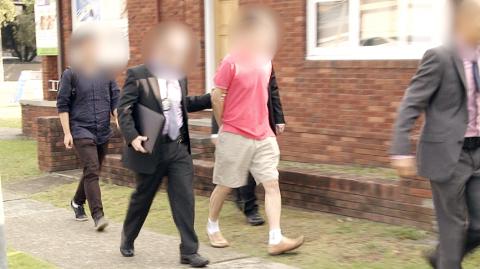Australian police yesterday said they had arrested a man accused of working on the black market to sell missile components and coal on behalf of North Korea, the first charges ever brought in Australia over the sale of weapons of mass destruction.
The man had been charged with two counts under an act preventing the proliferation of weapons of mass destruction, police said, and with another four under legislation enforcing UN and Australian sanctions against North Korea.
The Sydney man was identified by the Australian Broadcasting Corp and other media as 59-year-old Chan Han-choi, who they said had been living in Australia for more than 30 years and was of Korean descent.

Photo: EPA
He was arrested in the Sydney suburb of Eastwood on Saturday and was due to appear in court later yesterday, police said.
He came to the attention of authorities earlier this year, the Australian Federal Police (AFP) said.
“This man was a loyal agent of North Korea, who believed he was acting to serve some higher patriotic purpose,” AFP Assistant Commissioner Neil Gaughan told reporters.
“This case is like nothing we have ever seen on Australian soil,” he said.
Police allege that the man tried to broker the sale of missile components, including software for the guidance systems of ballistic missiles, as well as tried to sell coal to third parties in Indonesia and Vietnam.
Gaughan said the trade could have been worth “tens of millions of dollars” if successful.
Cash-strapped North Korea has come under a new round of stricter UN sanctions this year after pressing ahead with its missile and nuclear programs in defiance of international pressure.
Tensions have risen dramatically on the Korean Peninsula because of the North’s ballistic missile launches and its sixth and most powerful nuclear test, as well as joint military drills between South Korea and the US that the North describes as preparation for war.
Pyongyang claimed that its latest intercontinental ballistic missile launch last month had the range to reach all of the US.
US Secretary of State Rex Tillerson on Friday urged North Korea to carry out a “sustained cessation” of its weapons testing to allow talks about its missile and nuclear programs.
However, the North has shown little interest in talks until it has the ability to hit the US mainland with a nuclear-tipped missile, which many experts say it has yet to prove.
Gaughan said the man had been in touch with high-ranking North Korean officials, but no missile components ever made it to Australia.
He also said there was no indication officials in Indonesia or Vietnam had been involved in the attempted coal sales.

The CIA has a message for Chinese government officials worried about their place in Chinese President Xi Jinping’s (習近平) government: Come work with us. The agency released two Mandarin-language videos on social media on Thursday inviting disgruntled officials to contact the CIA. The recruitment videos posted on YouTube and X racked up more than 5 million views combined in their first day. The outreach comes as CIA Director John Ratcliffe has vowed to boost the agency’s use of intelligence from human sources and its focus on China, which has recently targeted US officials with its own espionage operations. The videos are “aimed at

STEADFAST FRIEND: The bills encourage increased Taiwan-US engagement and address China’s distortion of UN Resolution 2758 to isolate Taiwan internationally The Presidential Office yesterday thanked the US House of Representatives for unanimously passing two Taiwan-related bills highlighting its solid support for Taiwan’s democracy and global participation, and for deepening bilateral relations. One of the bills, the Taiwan Assurance Implementation Act, requires the US Department of State to periodically review its guidelines for engagement with Taiwan, and report to the US Congress on the guidelines and plans to lift self-imposed limitations on US-Taiwan engagement. The other bill is the Taiwan International Solidarity Act, which clarifies that UN Resolution 2758 does not address the issue of the representation of Taiwan or its people in

US Indo-Pacific Commander Admiral Samuel Paparo on Friday expressed concern over the rate at which China is diversifying its military exercises, the Financial Times (FT) reported on Saturday. “The rates of change on the depth and breadth of their exercises is the one non-linear effect that I’ve seen in the last year that wakes me up at night or keeps me up at night,” Paparo was quoted by FT as saying while attending the annual Sedona Forum at the McCain Institute in Arizona. Paparo also expressed concern over the speed with which China was expanding its military. While the US

SHIFT: Taiwan’s better-than-expected first-quarter GDP and signs of weakness in the US have driven global capital back to emerging markets, the central bank head said The central bank yesterday blamed market speculation for the steep rise in the local currency, and urged exporters and financial institutions to stay calm and stop panic sell-offs to avoid hurting their own profitability. The nation’s top monetary policymaker said that it would step in, if necessary, to maintain order and stability in the foreign exchange market. The remarks came as the NT dollar yesterday closed up NT$0.919 to NT$30.145 against the US dollar in Taipei trading, after rising as high as NT$29.59 in intraday trading. The local currency has surged 5.85 percent against the greenback over the past two sessions, central